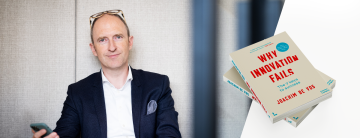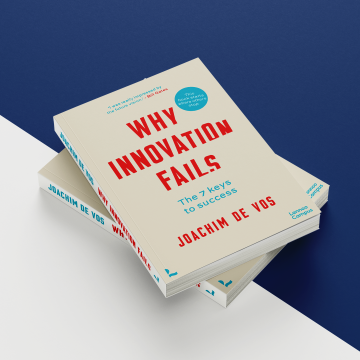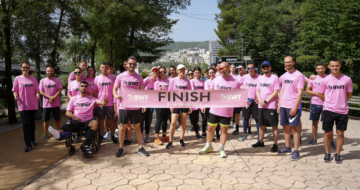Why innovation fails

Why do businesses and organisations succeed so rarely in being truly innovative? Why is that a problem? And what solutions are there? Joachim De Vos, CEO of Living Tomorrow and TomorrowLab, explains in his new book ‘Why innovation fails" in great detail where the bottlenecks are and provides the keys to change course.
Why do businesses and organisations succeed so rarely in being truly innovative? Why is that a problem? And what solutions are there? Joachim De Vos, CEO of Living Tomorrow and TomorrowLab, explains in his new book ‘Why innovation fails" in great detail where the bottlenecks are and provides the keys to change course.
Why Innovation Fails – the 7 keys to success
Why do businesses and organisations succeed so rarely in being truly innovative? Why is that a problem? And what solutions are there? Joachim De Vos, CEO of Living Tomorrow and TomorrowLab, explains in his new book ‘Why innovation fails' in great detail where the bottlenecks are and provides the keys to change course. For more than 25 years, he has shared these experiences with business leaders, policy makers and innovation teams worldwide, helping them develop what he calls ‘future fitness’. Why? "Because we are not experiencing an era of change, but a change of era."
With "Why innovation fails - the 7 keys to success" you will learn from the common pitfalls in an innovation process, you will gain insight into the technological evolution of the next ten years and you will translate all these insights into a concrete approach to build a future-proof and successfully innovating organization.
You can order the book now in both English and Dutch.
About Joachim De Vos
Joachim De Vos is CEO of Living Tomorrow and Professor of Scenario Planning at Ghent University. He also founded the innovation and strategy consultancy firm TomorrowLab, developing future scenarios, dynamic strategies and alternative business models. Joachim travels the world to give innovation and foresight advice and presentations to business leaders, innovation teams and policy makers. He is also a famous keynote speaker. Find out more about his keynote opportunities.

EXCLUSIVE - PERSONALIZED BOOKS
Would you like to purchase the book as a business gift? Starting from quantities greater than 100 you receive a quantity discount. Moreover, each book is packaged in a personalized luxury box!
Latest insights & stories

A Global Movement: The World Unites in a Pink Pledge for Clean and Sustainable Water
5,000 participants. 32 countries. €30,000 funds raised. And that's just the beginning.
Picture this: One step that sends ripples across the globe, transforming lives and creating waves of change. You might wonder, how can such a simple action for most of us have such a profound impact?

Sustainability and circularity in construction
Join us in transforming the future of construction, creating buildings that not only stand the test of time but also contribute to a healthier planet!

RainTunes: Shower scenarios for the soul
Light, hearing, smell, and touch: Together with experts, we have developed sensuous scenarios that turn showering into an individual experience. Whether you want to prepare for the day ahead or relax after working out. Whether you want to refresh after a day’s work or unwind at the end of the evening: RainTunes surprises with multisensory experiences.*
*Currently available only in Germany and Austria.